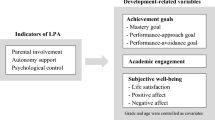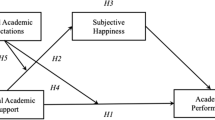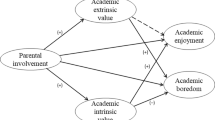Abstract
Positive and negative emotions are ubiquitous in everyday school life, and can foster or impair processes of learning and achievement. However, learning- and achievement-related emotions are not based solely on experiences from respective situations in the school context. Rather, experiences outside of school, e.g. learning at home, are also important. The present study focused on the importance of perceived parental support for children’s enjoyment of learning in the subject of mathematics. We were interested in the following two characteristics of perceived parental support: perceived parental control, in the sense of intrusive parental support, and perceived parental structure, in the sense of clarity of parents’ learning-related expectations. The central question concerned the predictive effects of intraindividual changes in perceived parental control and perceived parental structure with respect to intraindividual changes in enjoyment of learning. This issue was tested by means of a latent change model. Data were analyzed of 396 children (six measurement time points from the sixth to the eighth school year). The results showed the expected indirect positive effects of intraindividual changes in perceived parental structure, and indirect negative effects of intraindividual changes in perceived parental control, with regard to intraindividual changes in enjoyment of learning. In both cases, intraindividual changes in control beliefs and value beliefs acted as mediating variables.


Similar content being viewed by others
Notes
Bootstrapping is not available in Mplus when using the estimator MLR. However, as Muthén and Muthén (2012) state, the values for MLR correspond to those for the bootstrapping with the conventional maximum likelihood estimator (ML). To test indirect effects, the estimator ML was used.
References
Ahmed, W., Minnaert, A., van der Wef, G., & Kuyper, H. (2010). Perceived social support and early adolescents’ achievement: The mediational roles of motivational beliefs and emotions. Journal of Youth and Adolescence, 39, 36–46. doi:10.1007/s10964-008-9367-7.
Ahmed, W., van der Wef, G., Kuyper, H., & Minnaert, A. (2013). Emotions, self-regulated learning, and achievement in mathematics: A growth curve analysis. Journal of Educational Psychology, 105, 150–161. doi:10.1037/a0030160.
Assor, A., Kaplan, H., & Roth, G. (2002). Choice is good, but relevance is excellent: Autonomy-enhancing and suppressing teacher behaviors predicting students’ engagement in schoolwork. British Journal of Educational Psychology, 72(261), 278.
Brown, T. A. (2015). Confirmatory factor analysis for applied research (2nd ed.). New York: Guilford.
Buff, A. (2005). Kontrollüberzeugung [Self-efficacy]. In E. Klieme, C. Pauli & K. Reusser (Eds.), Dokumentation der Erhebungs- und Auswertungsinstrumente zur schweizerisch-deutschen Videostudie “Unterrichtsqualität, Lernverhalten und Mathematisches Verständnis”. Teil I: K. Rakoczy, A. Buff, & K. Reusser (Materialien zur Bildungsforschung Band 13) [Documentation of the data collection and evaluation tools in the Swiss-German video study “Quality of instruction, learning behavior and mathematical understanding. Part I: K. Rakoczy, A. Buff, & K. Reusser (Materials for Educational Research Volume 13] (pp. 20–21). Frankfurt a.M.: GFPLF & DIPF.
Buff, A. (2014). Enjoyment of learning and its personal antecedents: Testing the change–change assumption of the control-value theory of achievement emotions. Learning and Individual Differences, 31, 21–29. doi:10.1016/j.lindif.2013.12.007.
Buff, A., Nakamura, Y., Hollenweger, J., Leemann, R. J., Brückel, F., Maag Merki, & K., Isler, D. (Eds.). (2007). Dokumentation der Befragungsinstrumente—Lernstandserhebungen des Kantons Zürich Ende der 3. Klasse [Documentation of the survey instruments—State of Learning Surveys in the Canton of Zurich at the end of the 3rd grade]. Zürich: Pädagogische Hochschule Zürich: Departement Forschung und Entwicklung.
Buff, A., & Reusser, K. (2008). TRANSITION: Elterliche Unterstützung und motivational- affektive Entwicklung beim Übertritt in die Sekundarstufe I [TRANSITION: Parental support and motivational-affective development in the transition to lower secondary level] Retrieved 27.04.2016 from https://forsbase.unil.ch/project/study-public- overview/12656/0/.
Byrne, B. M., Shavelson, R. J., & Muthén, B. O. (1989). Testing for the equivalence of factor covariance and mean structures: The issue of partial measurement invariance. Psychological Bulletin, 105, 456–466.
Connell, J. P., & Wellborn, J. G. (1991). Competence, autonomy, and relatedness: A motivational analysis of self-system processes. In M. R. Gunnar & L. A. Sroufe (Eds.), Self processes and development (pp. 43–77). Hillsdale, NJ, England: Lawrence Erlbaum Associates Inc.
De Corte, E., & Verschaffel, L. (2006). Mathematical thinking and learning. In K. A. Renninger, & I. E. Sigel (Eds.), Handbook of child psychology, Volume 4: Child psychology and practice (pp. 103–152) (6th ed.). Hoboken, N.J.: John Wiley & Sons.
Dinkelmann, I., & Buff, A. (2016a). Vorfreude auf die Mathematikprüfung und ihre individuellen motivational-affektiven Antezedenzien: Ein Mediationsmodell [Anticipatory joy over the mathematics examination and its individual motivational- affective antecedents: A mediational Model]. Psychologie in Erziehung und Unterricht, 63, 220–237. doi:10.2378/peu2016.art14d.
Dinkelmann, I., & Buff, A. (2016b). Children’s and parents’ perceptions of parental support and their effects on children’s achievement motivation and achievement in mathematics. A longitudinal predictive mediation model. Learning and Individual Differences, 50, 122–132. doi:10.1016/jlindif.2016.06.029.
Dumont, H., Trautwein, U., Lüdtke, O., Neumann, M., Niggli, A., & Schnyder, I. (2012). Does parental homework involvement mediate the relationship between family background and educational outcomes? Contemporary Educational Psychology, 37, 55–69. doi:10.1016/j.cedpsych.2011.09.004.
Eccles, J. S. (2005). Subjective task value and the Eccles et al. model of achievement-related choices. In A. J. Elliot & C. S. Dweck (Eds.), Handbook of competence and motivation (pp. 105–121). New York: Guilford.
Enders, C. T. (2010). Applied missing data analysis. New York: The Guilford.
Fairchild, A. J., & McQuillin, S. D. (2010). Evaluating mediation and moderation effects in school psychology: A presentation of methods and review of current practice. Journal of School Psychology, 48, 53–84. doi:10.1016/j.jsp.2009.09.001.
Farkas, M. S., & Grolnick, W. S. (2010). Examining the components and concomitants of parental structure in the academic domain. Motivation and Emotion, 34, 266–279. doi:10.1007/s11031-010-9176-7.
Frenzel, A. C., Pekrun, R., & Goetz, T. (2007). Girls and mathematics—a “hopeless” issue? A control-value approach to gender differences in emotions towards mathematics. European Journal of Psychology of Education, 22, 497–514. doi:10.1007/BF03173468.
Geiser, C. (2012). Data analysis with Mplus. New York: Guilford.
Goetz, T., Frenzel, A. C., Stoeger, H., & Hall, N. C. (2010). Antecedents of everyday positive emotions: An experience sampling analysis. Motivation and Emotion, 34, 49–62. doi:10.1007/s11031-009-9152-2.
Goetz, T., Nett, U. E., Martiny, S. E., Hall, N. C., Pekrun, R., Dettmers, S., et al. (2012). Students’ emotions during homework: Structures, self-concept antecedents, and achievement outcomes. Learning and Individual Differences, 22, 225–234. doi:10.1016/j.linddif.2011.04006.
Goldin, G. A. (2014). Perspectives on emotion in mathematical engagement, learning, and problem solving. In R. Pekrun & L. Linnenbrink-Garcia (Eds.), International handbook of emotions in education (pp. 391–414). New York, NY, US: Routledge/Taylor & Francis Group.
Gonida, E. N., & Cortina, K. S. (2014). Parental involvement in homework: Relations with parent and student achievement-related motivational beliefs and achievement. British Journal of Educational Psychology, 84, 376–396. doi:10.1111/bjep.12039.
Grolnick, W. S., Friendly, R. W., & Bellas, V. M. (2009). Parenting and children’s motivation at school. In K. R. Wentzel & A. Wigfield (Eds.), Handbook of motivation at school (pp. 279–300). New York: Routlege/Taylor & Francis.
Grolnick, W. S., & Pomerantz, E. M. (2009). Issues and challenges in studying parental control: Toward a new conceptualization. Child Development Perspectives, 3, 165–170. doi:10.1111/j.1750-8606.2009.00099.x.
Grolnick, W. S., Raftery-Helmer, J. N., Flamm, E. S., Marbell, K. N., & Cardemil, E. V. (2014). Parental provision of academic structure and the transition to middle school. Journal of Research on Adolescence,. doi:10.1111/jora.12161.
Jang, H., Reeve, J., & Deci, E. L. (2010). Engaging students in learning activities: It is not autonomy support or structure but support and structure. Journal of Educational Psychology, 102, 588–600. doi:10.1037/a0019682.
Jullien, S. (2006). Elterliches Engagement und Lern- & Leistungsemotionen [Parental engagement and learning & achievement emotions]. München: Herbert Utz Verlag.
Kleine, M., Goetz, T., Pekrun, R., & Hall, N. (2005). The structure of students’ emotions experienced during a mathematical achievement test. ZDM, 37, 221–225.
Little, T. D. (2013). Longitudinal structural equation modeling. New York: The Guilford.
Lorenz, F., & Wild, E. (2007). Parental involvement in schooling. In M. Prenzel (Ed.), Studies on the educational quality of schools. The final report on the DFG Priority Program (pp. 299–316). Münster: Waxmann.
Luo, W., Ng, P. T., Lee, K., & Aye, K. M. (2016). Self-efficacy, value, and achievement emotions as mediators between parenting practice and homework behavior: A control-value theory perspective. Learning and Individual Differences,. doi:10.1016/J.lindif.2016.07.017.
MacKinnon, D. P., Lockwood, C. M., Hoffmann, J. M., West, S. G., & Sheets, V. (2002). A comparison of methods to test mediation and other intervening variable effects. Psychological Methods, 7, 83–104. doi:10.1037//1082-989X.7.1.83.
MacKinnon, D. P., Lockwood, C. M., & Williams, J. (2004). Confidence limits for the indirect effect: Distribution of the product and resampling methods. Multivariate Behavioral Research, 39, 99–128. doi:10.1037//1082-989X.7.1.83.
Moser, U., & Hollenweger, J. (Eds.). (2008). Drei Jahre danach [Three years later]. Oberentfelden: Sauerländer.
Muthén, B. O., & Muthén, L. K. (2012). Mplus user’s guide (7th ed.). Los Angeles, CA: Muthén & Muthén.
Niggli, A., Villiger, C., Wandeler, C., Kutzelmann, S., & Leopold, P. (2007). Projekt LiFuS (Lesen in Familie und Schule) [LiFuS project (reading in the family and at school)]. Skalenhandbuch [Scale handbook]. Fribourg: Pädagogische Hochschule Fribourg.
Pekrun, R. (2006). The control-value theory of achievement emotions: Assumptions, corollaries, and implications for educational research and practice. Educational Psychology Review, 18, 315–341. doi:10.1007/s10648-006-9029-9.
Pekrun, R., Goetz, T., & Perry, R. P. (2005). Achievement Emotions Questionnaire (AEQ)—User’s manual. Unpublished manuscript, Universities of Munich (Germany) and Manitoba (Canada), Departments of Psychology.
Pekrun, R., Goetz, T., Titz, W., & Hofmann, H. (2002). Mythen in der Jugend- und Schulleistungsforschung: Möglichkeiten und Grenzen populationsorientierter Untersuchungen [Myths in research on youth and academic achievement: Benefits and limitations of population-based studies]. In H. Merkens, & J. Zinnecker (Eds.), Jahrbuch Jugendforschung (pp. 127–143) (2nd ed.). Opladen: Leske + Budrich. doi:10.1007/978-3-322-80893-6.
Pekrun, R., Jullien, S., Zirngibl, A., Blum, W., Goetz, T., Vom Hofe, R., & Wartha, S. (2003). PALMA Projekt zur Analyse der Leistungsentwicklung in Mathematik. Skalenhandbuch Erhebungswelle II: Juli 2003 (Stand 29.9.2003) [PALMA project on the analysis of achievement development in mathematics. Scale handbook survey wave II: July 2003 (as of 29.09.2003)]. München: Universität München, Department für Psychologie.
Pekrun, R., & Perry, R. P. (2014). Control-value theory of achievement emotions. In R. Pekrun & L. Linnenbrink-Garcia (Eds.), International handbook of emotions in education (pp. 120–141). New York, NY, US: Routledge/Taylor & Francis Group.
Pekrun, R., & Stephens, E. J. (2012). Academic emotions. In K. R. Harris, S. Graham, & T. Urdan (Eds.), APA Educational psychology handbook: Vol. 2. Individual differences and cultural and contextual factors (pp. 3–31). Washington, D.C.: American Psychological Association. doi:10.1037/13274-001.
Pomerantz, E. M., & Grolnick, W. S. (2009). Toward a clear and inclusive conceptualization of parental control: Reply to the commentaries. Child Development Perspectives, 3, 176–177. doi:10.1111/j.1750-8606.2009.00102.x.
Pomerantz, E. M., Moorman, E. A., & Litwack, S. D. (2007). The how, whom, and why of parents’ involvement in children’s academic lives: More is not always better. Review of Educational Research, 77, 373–410. doi:10.3102/003465430305567.
Preacher, K. J., & Hayes, A. F. (2008). Asymptotic and resampling strategies for assessing and computing indirect effects in multiple mediator models. Behavior Research Methods, 40, 879–891. doi:10.3758/BRM.40.3.879.
Rakoczy, K., Klieme, E., Drollinger-Vetter, B., Lipowsky, F., Pauli, C., & Reusser, K. (2007). Structure as a quality feature in mathematics instruction. Cognitive and motivational effects of a structured organisation of the learning environment vs. a structured presentation of learning content. In M. Prenzel (Ed.), Studies on the educational quality of schools. The final report on the DFG Priority Programme (pp. 100–120). Münster, Germany: Waxmann.
Reiss, K., & Reiss, M. (2006). Unterrichtsqualität und der Mathematikunterricht [Quality of instruction and mathematics teaching]. In I. Hosenfeld, & F.-W. Schrader (Hrsg.), Schulische Leistungen. Grundlagen Bedingungen, Perspektiven (pp. 225–242). Münster: Waxmann.
Reuter, T., Ziegelmann, J. P., Wiedemann, A. U., Geiser, C., Lippke, S., Schüz, B., et al. (2010). Changes in intentions, planning, and self-efficacy predict changes in behaviors: An application of latent true change modeling. Journal of Health Psychology, 15, 935–947. doi:10.1177/1359105309360071.
Schukajlow, S., Leiss, D., Pekrun, R., Blum, W., Müller, M., & Messner, R. (2012). Teaching methods for modelling problems and students’ task-specific enjoyment, value, interest and self-efficacy expectations. Educational Studies in Mathematics, 79, 215–237. doi:10.1007/s10649-011-9341-2.
Selig, J. P., & Preacher, K. J. (2009). Mediation models for longitudinal data in developmental research. Research in Human Development, 6, 144–164. doi:10.1080/15427600902911247.
Skinner, E. (1996). A guide to constructs of control. Journal of Personality and Social Psychology, 71, 549–570. doi:10.1037/0022-3514.71.3.549.
Skinner, E. A., Johnson, S., & Snyder, T. (2005). Six dimensions of parenting: A motivational model. Parenting, 5, 175–235. doi:10.1207/s15327922par0502_3.
Soenens, B., & Vansteenkiste, M. (2010). A theoretical upgrade of the concept of parental psychological control: Proposing new insights on the basis of self-determination theory. Developmental Review, 30, 74–99. doi:10.1016/j.dr.2009.11.001.
Steyer, R., Partchev, I., & Shanahan, M. J. (2000). Modeling true intraindividual change in structural equation models: The case of poverty and children’s psychological adjustment. In T. D. Little, K. U. Schnabel, & J. Baumert (Eds.), Modeling longitudinal and multilevel data (pp. 109–126). Mahwah, NJ: Erlbaum.
Vansteenkiste, M., Zhou, M., Lens, W., & Soenens, B. (2005). Experiences of autonomy and control among Chinese learners: Vitalizing or immobilizing? Journal of Educational Psychology, 97, 468–483. doi:10.1037/0022-0663.97.3.468.
Wild, E., Remy, K., Gerber, J., Exeler, J., Rammert, M., Siegmund, A., & Knollmann, M. (2005). Die Förderung selbstbestimmter Formen der Lernmotivation in Elternhaus und Schule. Dokumentation der Skalen und Itemauswahl für den Kinderfragebogen [Fostering self-determined forms of learning motivation at home and at school. Documentation of the scales and item selection for the child questionnaire]. Bielefeld: Universität Bielefeld.
Acknowledgements
The study TRANSITION “Parental support and motivational—affective development in the transition to lower secondary level” was supported by Grant 100014-122409 from the Swiss National Science Foundation. We would like to thank Sarah Mannion de Hernandez for translating the article into English.
Author information
Authors and Affiliations
Corresponding author
Rights and permissions
About this article
Cite this article
Buff, A., Reusser, K. & Dinkelmann, I. Parental support and enjoyment of learning in mathematics: Does change in parental support predict change in enjoyment of learning?. ZDM Mathematics Education 49, 423–434 (2017). https://doi.org/10.1007/s11858-016-0823-7
Accepted:
Published:
Issue Date:
DOI: https://doi.org/10.1007/s11858-016-0823-7




